-

新人教版高中英语选修2Unit 1 Science and Scientists-Using langauge教学设计
This happens because the dish soap molecules have a strong negative charge, and the milk molecules have a strong positive charge. Like magnets, these molecules are attracted to each other, and so they appear to move around on the plate, taking the food coloring with them, making it look like the colors are quickly moving to escape from the soap.Listening text:? Judy: Oh, I'm so sorry that you were ill and couldn't come with us on our field trip. How are you feeling now? Better?? Bill: Much better, thanks. But how was it?? Judy: Wonderful! I especially liked an area of the museum called Light Games.it was really cool. They had a hall of mirrors where I could see myself reflected thousands of times!? Bill: A hall of mirrors can be a lot of fun. What else did they have?? Judy: Well, they had an experiment where we looked at a blue screen for a while, and then suddenly we could see tiny bright lights moving around on it. You'll never guess what those bright lights were!? Bill: Come on, tell me!? Judy: They were our own blood cells. For some reason, our eyes play tricks on us when we look at a blue screen, and we can see our own blood cells moving around like little lights! But there was another thing I liked better. I stood in front of a white light, and it cast different shadows of me in every color of the rainbow!? Bill: Oh, I wish I had been there. Tell me more!? Judy: Well, they had another area for sound. They had a giant piano keyboard that you could use your feet to play. But then, instead of playing the sounds of a piano, it played the voices of classical singers! Then they had a giant dish, and when you spoke into it, it reflected the sound back and made it louder. You could use it to speak in a whisper to someone 17 meters away.? Bill: It all sounds so cool. I wish I could have gone with you? Judy: I know, but we can go together this weekend. I'd love to go there again!? Bill: That sounds like a great idea!

新人教版高中英语选修2Unit 2 Bridging Cultures-Discovering useful structures教学设计
The grammar of this unit is designed to review noun clauses. Sentences that use nouns in a sentence are called noun clauses. Nominal clauses can act as subject, object, predicate, appositive and other components in compound sentences. According to the above-mentioned different grammatical functions, nominal clauses are divided into subject clause, object clause, predicate clause and appositive clause. In this unit, we will review the three kinds of nominal clauses. Appositive clauses are not required to be mastered in the optional compulsory stage, so they are not involved.1. Guide the students to judge the compound sentences and determine the composition of the clauses in the sentence.2. Instruct students to try to learn grammar by generalizing grammar rules, controlling written practice, and semi-open oral output.3. Inspire the students to systematize the function and usage of noun clause1.Instruct students to try to learn grammar by generalizing grammar rules, controlling written practice, and semi-open oral output.2.Inspire the students to systematize the function and usage of noun clauseStep1: The teacher ask studetns to find out more nominal clauses from the reading passage and udnerline the nominal clauses.

新人教版高中英语选修2Unit 3 Food and Culture-Discovering useful structures教学设计
The newspaper reported more than 100 people had been killed in the thunderstorm.报纸报道说有一百多人在暴风雨中丧生。(2)before、when、by the time、until、after、once等引导的时间状语从句的谓语是一般过去时,以及by、before后面接过去的时间时,主句动作发生在从句的动作或过去的时间之前且表示被动时,要用过去完成时的被动语态。By the time my brother was 10, he had been sent to Italy.我弟弟10岁前就已经被送到意大利了。Tons of rice had been produced by the end of last month. 到上月底已生产了好几吨大米。(3) It was the first/second/last ... time that ...句中that引导的定语从句中,主语与谓语构成被动关系时,要用过去完成时的被动语态。It was the first time that I had seen the night fact to face in one and a half years. 这是我一年半以来第一次亲眼目睹夜晚的景色。(4)在虚拟语气中,条件句表示与过去事实相反,且主语与谓语构成被动关系时,要用过去完成时的被动语态。If I had been instructed by him earlier, I would have finished the task.如果我早一点得到他的指示,我早就完成这项任务了。If I had hurried, I wouldn't have missed the train.如果我快点的话,我就不会误了火车。If you had been at the party, you would have met him. 如果你去了晚会,你就会见到他的。

新人教版高中英语选修2Unit 3 Food and Culture-Reading and thinking教学设计
The discourse explores the link between food and culture from a foreign’s perspective and it records some authentic Chinese food and illustrates the cultural meaning, gerography features and historic tradition that the food reflects. It is aimed to lead students to understand and think about the connection between food and culture. While teaching, the teacher should instruct students to find out the writing order and the writer’s experieces and feelings towards Chinese food and culture.1.Guide the students to read the text, sort out the information and dig out the topic.2.Understand the cultural connotation, regional characteristics and historical tradition of Chinese cuisine3.Understand and explore the relationship between food and people's personality4.Guide the students to use the cohesive words in the text5.Lead students to accurately grasp the real meaning of the information and improve the overall understanding ability by understanding the implied meaning behind the text.1. Enable the Ss to understand the structure and the writing style of the passage well.2. Lead the Ss to understand and think further about the connection between food and geography and local character traits.Step1: Prediction before reading. Before you read, look at the title, and the picture. What do you think this article is about?keys:It is about various culture and cuisine about a place or some countries.

新人教版高中英语选修2Unit 5 First Aid-Discovering useful structures教学设计
You have no excuse for not going.你没有理由不去。He was punished for not having finished his homework.他因未完成作业而受到惩罚。2.动词ing形式复合结构由物主代词或人称代词宾格、名词所有格或普通格加动词ing,即“sb./sb.'s+doing”构成。动词ing形式的复合结构实际上是给动词ing形式加了一个逻辑主语。动词ing形式的复合结构有四种形式:①形容词性物主代词+动词ing②名词所有格+动词ing③代词宾格+动词ing④名词+动词ingHer coming to help encouraged all of us.她来帮忙鼓舞了我们所有人。The baby was made awake by the door suddenly shutting.这个婴儿被突然的关门声吵醒了。Can you imagine him/Jack cooking at home?你能想象他/杰克在家做饭的样子吗?无生命名词无论是作主语还是作宾语都不能用第②种形式。Tom's winning first prize last year impressed me a lot.汤姆去年得了一等奖使我印象深刻。Do you mind my/me/Jack's/Jack leaving now?你介意我/杰克现在离开吗?Excuse me for my not coming on time.很抱歉我没能按时来。His father's being ill made him worried.他父亲病了,他很担心。We are looking forward to the singer's/the singer to give us a concert.我们盼望着这位歌手来给我们举办一场演唱会。
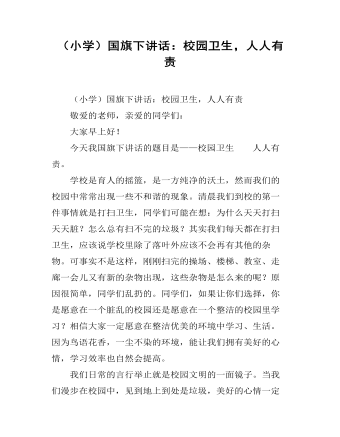
(小学)国旗下讲话:校园卫生,人人有责
今天我国旗下讲话的题目是——校园卫生 人人有责。学校是育人的摇篮,是一方纯净的沃土,然而我们的校园中常常出现一些不和谐的现象。清晨我们到校的第一件事情就是打扫卫生,同学们可能在想:为什么天天打扫天天脏?怎么总有扫不完的垃圾?其实我们每天都在打扫卫生,应该说学校里除了落叶外应该不会再有其他的杂物。可事实不是这样,刚刚扫完的操场、楼梯、教室、走廊一会儿又有新的杂物出现,这些杂物是怎么来的呢?原因很简单,同学们乱扔的。同学们,如果让你们选择,你是愿意在一个脏乱的校园还是愿意在一个整洁的校园里学习?相信大家一定愿意在整洁优美的环境中学习、生活。因为鸟语花香,一尘不染的环境,能让我们拥有美好的心情,学习效率也自然会提高。
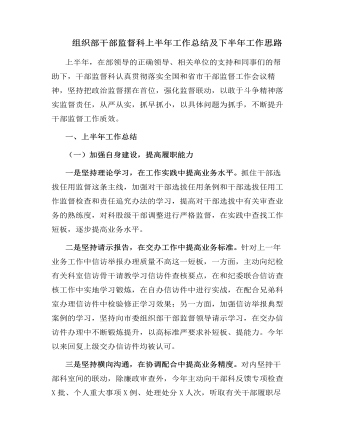
组织部干部监督科上半年工作总结及下半年工作思路
加大专项检查人才队伍储备力度,注重培养候补专项检查组长,优胜劣汰,以老带新,形成良性循环,选优配强每一轮每一个专项检查组,紧紧围绕选人用人、县委中心工作严格进行检查,对发现的问题严肃问责,监督单位做好整改工作。三是狠抓预警研判,持之以恒的做好日常监督。积极推动与其他方面监督的深度融合,不断完善“大监督”工作格局,增强监督合力。在日常工作中注重问题的预警研判,把从严监督贯穿到干部教育培训、考核评价、选拔任用全过程。提高监督的主动性,抓早抓小,对发现的问题审慎进行组织处理,及时提醒,督促改进提高,防止小毛病演变成大问题。提高监督的自觉性,抓细抓严,做好常态化管理工作,堵塞漏洞、从严管理。提高监督的警觉性,抓关键抓落实,坚持部内部外的纵向横向联动,紧盯“一把手”、特殊单位、关键岗位,紧扣上级和县委部署的重要工作,围绕政策执行和工作落实情况开展监督。
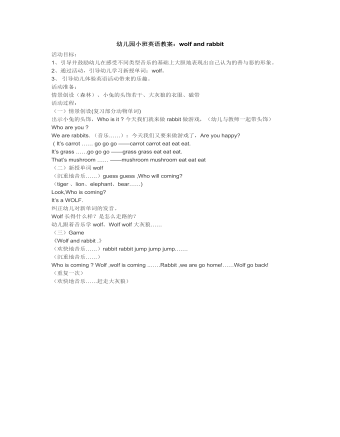
幼儿园小班英语教案:wolf and rabbit
2、通过活动,引导幼儿学习新授单词:wolf。 3、 引导幼儿体验英语活动带来的乐趣。 活动准备: 情景创设(森林)、小兔的头饰若干、大灰狼的衣服、磁带 活动过程: (一)情景创设(复习部分动物单词) 出示小兔的头饰,Who is it ? 今天我们就来做rabbit做游戏,(幼儿与教师一起带头饰) Who are you ? We are rabbits. (音乐……):今天我们又要来做游戏了,Are you happy? ( It’s carrot …… go go go ——carrot carrot eat eat eat.It’s grass ……go go go ——grass grass eat eat eat.That’s mushroom …… ——mushroom mushroom eat eat eat(
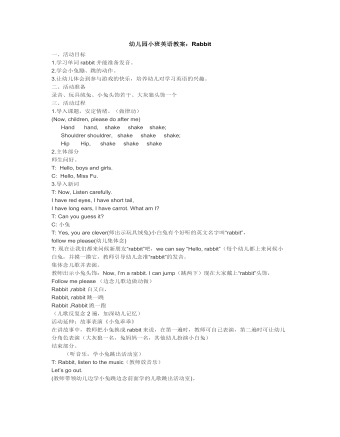
幼儿园小班英语教案:Rabbit
二、活动准备 录音、玩具绒兔、小兔头饰若干、大灰狼头饰一个 三、活动过程 1.导入课题,安定情绪。(做律动) (Now, children, please do after me) Hand hand, shake shake shake; Shouldrer shouldrer, shake shake shake; Hip Hip, shake shake shake2.主体部分 师生问好。 T: Hello, boys and girls. C: Hello, Miss Fu. 3.导入新词 T: Now, Listen carefully. I have red eyes, I have short tail, I have long ears, I have carrot. What am I?T: Can you guess it? C: 小兔 T: Yes, you are clever(师出示玩具绒兔)小白兔有个好听的英文名字叫“rabbit”,follow me please(幼儿集体念)
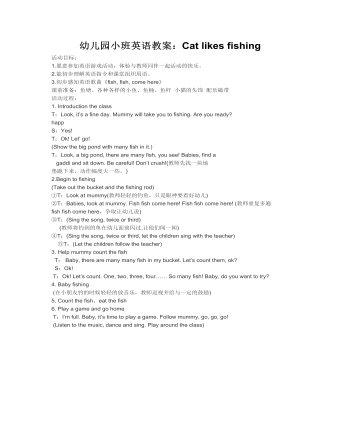
幼儿园小班英语教案:Cat likes fishing
3.初步感知英语歌曲《fish, fish, come here》 课前准备:鱼塘、各种各样的小鱼、鱼桶、鱼杆 小猫的头饰 配乐磁带 活动过程: 1. Introduction the class T:Look, it’s a fine day. Mummy will take you to fishing. Are you ready?happ S:Yes! T:Ok! Let’ go!(Show the big pond with many fish in it.)T:Look, a big pond, there are many fish, you see! Babies, find a gaddi and sit down. Be careful! Don’t crush!(教师先找一块地 垫跪下来,动作幅度大一些。)
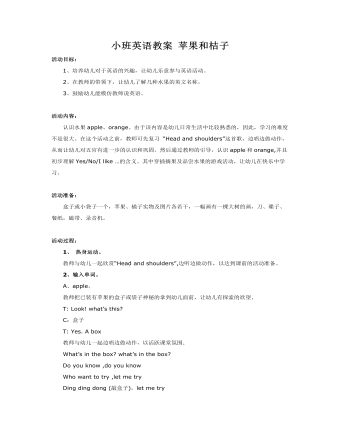
小班英语教案 苹果和桔子
2、在教师的带领下,让幼儿了解几种水果的英文名称。3、鼓励幼儿能模仿教师说英语。 活动内容: 认识水果apple、orange。由于该内容是幼儿日常生活中比较熟悉的,因此,学习的难度不是很大。在这个活动之前,教师可先复习 “Head andshoulders”这首歌,边唱边做动作,从而让幼儿对五官有进一步的认识和巩固。然后通过教师的引导,认识apple和orange,并且初步理解Yes/No/I like …的含义。其中穿插摘果及品尝水果的游戏活动,让幼儿在快乐中学习。 活动准备: 盒子或小袋子一个,苹果、橘子实物及图片各若干,一幅画有一棵大树的画,刀、碟子、餐纸,磁带、录音机。活动过程:1、热身运动。 教师与幼儿一起欣赏“Head andshoulders”,边听边做动作,以达到课前的活动准备。
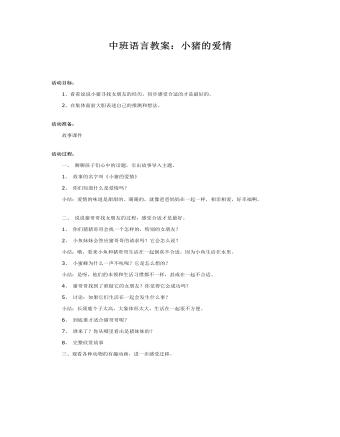
中班语言教案:小猪的爱情
活动准备: 故事课件活动过程: 一、聊聊孩子们心中的话题,引出故事导入主题。1、故事的名字叫《小猪的爱情》2、你们知道什么是爱情吗? 小结:爱情的味道是甜甜的、暖暖的,就像爸爸妈妈在一起一样,相亲相爱,好幸福啊。 二、说说猪哥哥找女朋友的过程,感受合适才是最好。1、你们猜猪哥哥会找一个怎样的,特别的女朋友?2、小鱼妹妹会答应猪哥哥的请求吗?它会怎么说? 小结:哦,看来小鱼和猪哥哥生活在一起倒真不合适,因为小鱼生活在水里。
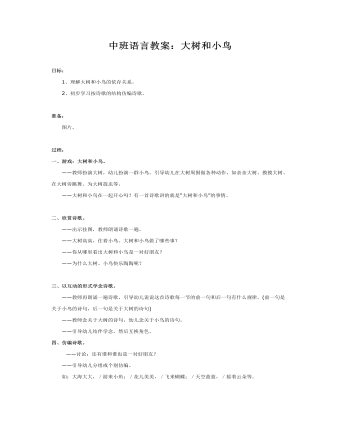
中班语言教案:大树和小鸟
2、初步学习按诗歌的结构仿编诗歌。 准备: 图片。 过程:一、游戏:大树和小鸟。——教师扮演大树,幼儿扮演一群小鸟。引导幼儿在大树周围做各种动作,如亲亲大树、摸摸大树、在大树旁跳舞、为大树捉虫等。——大树和小鸟在一起开心吗?有一首诗歌讲的就是“大树和小鸟”的事情。
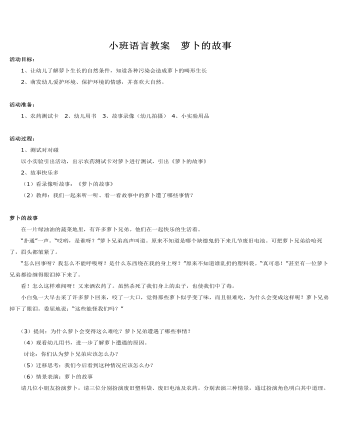
小班语言教案 萝卜的故事
活动过程:1、测试对对碰 以小实验引出活动,出示农药测试卡对萝卜进行测试,引出《萝卜的故事》2、故事快乐多 (1)看录像听故事:《萝卜的故事》 (2)教师:我们一起来听一听、看一看故事中的萝卜遭了哪些事情? 萝卜的故事 在一片绿油油的蔬菜地里,有许多萝卜兄弟。他们在一起快乐的生活着。“扑通”一声。“哎哟,是谁呀?”萝卜兄弟高声叫道。原来不知道是哪个缺德鬼扔下来几节废旧电池。可把萝卜兄弟给呛死了,眉头都皱紧了。“怎么回事呀?我怎么不能呼吸呀?是什么东西绕在我的身上呀?”原来不知道谁乱扔的塑料袋。“真可恶!”甚至有一位萝卜兄弟都给缠得眼泪掉下来了。 看!怎么这样难闻呀!又来洒农药了。虽然杀死了我们身上的虫子,也使我们中了毒。 小白兔一大早去采了许多萝卜回来,咬了一大口,觉得那些萝卜似乎变了味,而且很难吃,为什么会变成这样呢?萝卜兄弟掉下了眼泪。委屈地说:“这些能怪我们吗?”
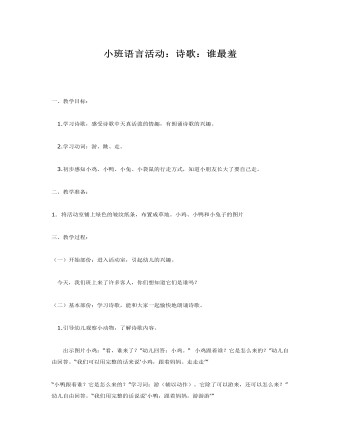
小班语言教案诗歌 谁最羞
2.学习动词:游、跳、走。3.初步感知小鸡、小鸭、小兔、小袋鼠的行走方式,知道小朋友长大了要自己走。二、教学准备:1. 将活动室铺上绿色的皱纹纸条,布置成草地。小鸡、小鸭和小兔子的图片 三、教学过程:(一)开始部份:进入活动室,引起幼儿的兴趣。 今天,我们班上来了许多客人,你们想知道它们是谁吗?
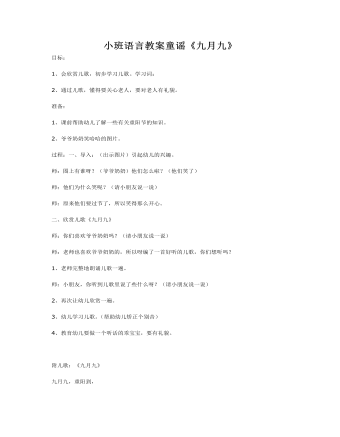
小班语言教案童谣《九月九》
2、通过儿歌,懂得要关心老人,要对老人有礼貌。准备:1、课前帮助幼儿了解一些有关重阳节的知识。2、爷爷奶奶笑哈哈的图片。过程:一、导入:(出示图片)引起幼儿的兴趣。师:图上有谁呀?(爷爷奶奶)他们怎么啦?(他们笑了)师:他们为什么笑呢?(请小朋友说一说)师:原来他们要过节了,所以笑得那么开心。
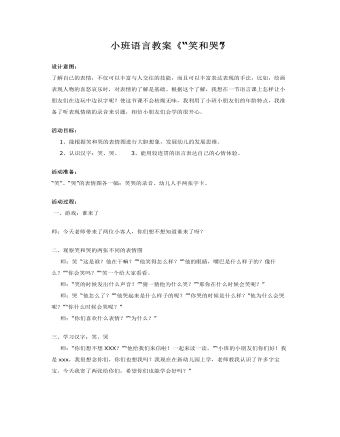
小班语言教案《“笑和哭”》
活动目标: 1、能根据笑和哭的表情图进行大胆想象,发展幼儿的发展思维。 2、认识汉字:笑、哭。 3、能用较连贯的语言表达自己的心情体验。活动准备:“笑”、“哭”的表情图各一幅;笑哭的录音、幼儿人手两张字卡。活动过程: 一、游戏:谁来了师:今天老师带来了两位小客人,你们想不想知道谁来了呀?二、观察笑和哭的两张不同的表情图 师:笑 “这是谁?他在干嘛?”“他笑得怎么样?”“他的眼睛,嘴巴是什么样子的?像什么?”“你会笑吗?”“笑一个给大家看看。 师:“笑的时候发出什么声音?”“猜一猜他为什么笑?”“那你在什么时候会笑呢?” 师:哭 “他怎么了?”“他哭起来是什么样子的呢?”“你哭的时候是什么样?”他为什么会哭呢?““你什么时候会哭呢?” 师:“你们喜欢什么表情?”“为什么?”
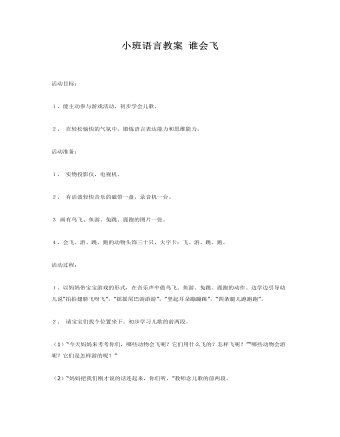
小班语言教案 谁会飞
2、在轻松愉快的气氛中,锻炼语言表达能力和思维能力。活动准备:1、实物投影仪,电视机。2、有活泼轻快音乐的磁带一盘,录音机一台。3画有鸟飞、鱼游、兔跳、鹿跑的图片一张。4、会飞、游、跳、跑的动物头饰三十只,大字卡:飞、游、跳、跑。活动过程:1、以妈妈带宝宝游戏的形式,在音乐声中做鸟飞、鱼游、兔跳、鹿跑的动作。边学边引导幼儿说“拍拍翅膀飞呀飞”,“摇摇尾巴游游游”,“竖起耳朵蹦蹦跳”,“四条腿儿跑跑跑”。
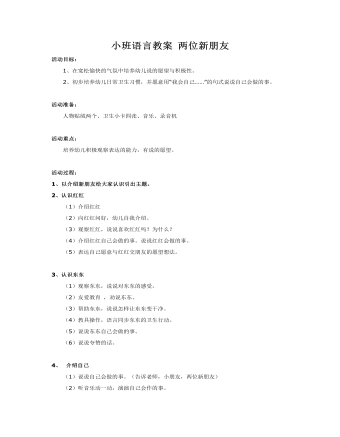
小班语言教案 两位新朋友
活动准备: 人物贴绒两个、卫生小卡四张、音乐、录音机 活动重点: 培养幼儿积极观察表达的能力,有说的愿望。 活动过程:1、以介绍新朋友给大家认识引出主题。2、认识红红 (1)介绍红红 (2)向红红问好,幼儿自我介绍。 (3)观察红红,说说喜欢红红吗?为什么? (4)介绍红红自己会做的事。说说红红会做的事。 (5)表达自己愿意与红红交朋友的愿望想法。
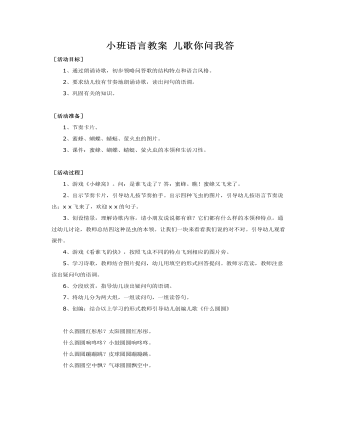
小班语言教案 儿歌你问我答
[活动准备]1、节奏卡片。2、蜜蜂、蝴蝶、蜻蜓、萤火虫的图片。3、课件:蜜蜂、蝴蝶、蜻蜓、萤火虫的本领和生活习性。 [活动过程]1、游戏《小蜂窝》。问:是谁飞走了?答:蜜蜂。瞧!蜜蜂又飞来了。2、出示节奏卡片,引导幼儿按节奏拍手。出示四种飞虫的图片,引导幼儿按语言节奏说出:x x飞来了,欢迎x x的句子。3、创设情景,理解诗歌内容。请小朋友说说都有谁?它们都有什么样的本领和特点。通过幼儿讨论,教师总结四这种昆虫的本领。让我们一块来看看我们说的对不对。引导幼儿观看课件。
